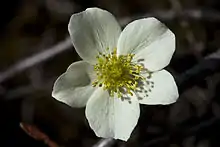Anemone parviflora
Anemone parviflora, the northern anemone, or small-flowered anemone, is a herbaceous plant species in the genus Anemone and family Ranunculaceae. Plants grow 10 to 30 cm tall, from a thin, 2 mm thick rhizome. Stem leaves without petioles, basal leaves few with long petioles and deeply 3-parted. Plants flowering late spring to mid summer with the flowers composed of 5 or 6 sepals normally white or soft bluish colored, 8 to 13 mm long. The plants produce one peduncle with one solitary flower. Fruits in heads ovoid in shape, 10 mm long or less, fruits densely woolly, not winged and with straight 1 to 2.5 mm long beaks.
| Anemone parviflora | |
|---|---|
 | |
| Scientific classification | |
| Kingdom: | Plantae |
| Clade: | Tracheophytes |
| Clade: | Angiosperms |
| Clade: | Eudicots |
| Order: | Ranunculales |
| Family: | Ranunculaceae |
| Genus: | Anemone |
| Species: | A. parviflora |
| Binomial name | |
| Anemone parviflora Michx. | |
Native to central and western North America mostly in Canada and Alaska but also south to Idaho and even into Utah where it is found growing on wet rocky ledges, meadows and along stream banks in normally calcareous soils.[1]
References
- Flora of North America Editorial Committee (1997). Flora of North America Vol 3, Magnoliophyta:Magnoliidae and Hamamelidae. Oxford University Press. pp. 139–158. ISBN 0-19-511246-6.